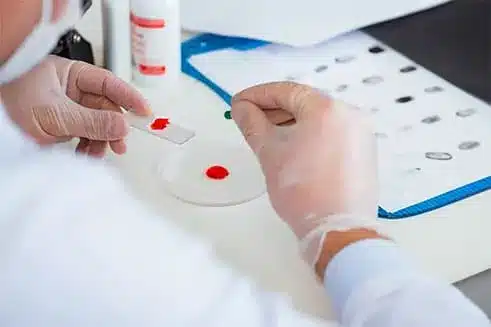Motivational Interviewing Therapy at Ascendant
Partner with Ascendant to Enhance Your Recovery
At Ascendant, we understand that the journey to recovery is uniquely personal and requires a supportive approach. Motivational Interviewing Therapy (MI) is adept at helping people change and make meaningful progress against addiction struggles. Our empathetic approach focuses on strengthening your intrinsic motivation and resolving ambivalence towards recovery.
By partnering with you in a collaborative, non-judgmental environment, we help you set and achieve your goals, empowering you to embrace positive changes with confidence. Together, we can navigate your path to recovery and a renewed sense of hope for a brighter, healthier future.

What is Motivational Interviewing Therapy?
Motivational interviewing is a collaborative, person-centered, and evidence-based counseling technique that focuses on enhancing an individual’s intrinsic motivation to change.[1] Unlike more directive approaches in psychotherapy, motivational interviewing relies on a guiding style where the therapist works in partnership with the client to explore and resolve ambivalence about making changes (refered to as the “evocation of change talk”) in their life.
This counseling style is particularly beneficial for those who may be struggling with substance use disorders, unhealthy behaviors, or a general lack of motivation to address personal challenges. By tapping into the client’s own values, goals, and personal reasons for change, motivational interviewing can help foster a sense of autonomy and self-efficacy that is essential for lasting behavioral transformation.

Unlike confrontational approaches that can often provoke resistance, the motivational interviewing process respects the client’s pace and readiness for change. [2] By honoring the client’s autonomy, the therapist helps them tap into their own inner resources and intrinsic drivers, ultimately increasing the likelihood of successful, sustainable change.
Ascendant’s clinicians strive to create a non-judgmental, empathetic environment where clients feel safe to openly explore their thoughts, feelings, and beliefs about change. Through a series of strategic questioning, reflective listening, and affirmation, the therapist helps the client navigate their ambivalence, identify their own motivations for change, and develop a personalized plan of action to support self-efficacy in this adaptive counseling approach.
Throughout the motivational interviewing sessions, clients can expect to engage in collaborative discussions, set personalized goals, and receive ongoing encouragement and support as they work to transform their lives. This empowering, client-centered approach has been widely recognized as an effective evidence-based practice for addressing a variety of behavioral health concerns.
How Does Motivational Interviewing Therapy Work
Motivational interviewing for substance abuse is a collaborative, goal-oriented form of counseling that helps individuals resolve their ambivalence about change and tap into their own intrinsic motivation. Principles in motivational interviewing posit that lasting change is most likely to occur when it comes from within, rather than being externally imposed:[3]
Substance Abuse
MI for Substance Abuse at Ascendant
By focusing on your personal values, goals, and reasons for change, the motivational interviewing for addiction process can be particularly effective in reducing substance use and promoting long-term recovery.
During MI sessions, our team works collaboratively with clients to:
By empowering clients to take an active role in their own recovery, the motivational interviewing approach helps to cultivate a sense of ownership and commitment to lasting change. This, in turn, increases the likelihood of successful outcomes in addressing substance use and maintaining long-term sobriety.
Efficacy of Motivational Interviewing Therapy
Extensive research has demonstrated the efficacy of motivational interviewing in the treatment of substance use disorders, along with a wide range of other health-related behaviors. Studies have shown that MI is generally equal to or more effective than other viable treatment approaches, as well as up to 20 percent more effective than no treatment at all.[4]

A comprehensive meta-analysis examined the impact of MI across a variety of areas, including substance use, risky behaviors, and treatment engagement.[5] The findings showed there were significant effect sizes for MI as an approach for several mental health concerns, and that the overall evidence suggests that motivational interviewing has a significant and clinically relevant effect in approximately three out of every four studies. Additionally, the researchers found that even brief MI encounters of just 15 minutes were able to produce a positive effect in 64% of the studies.
These findings underscore the potency of the motivational interviewing approach, particularly in the context of addiction treatment.[6] By tapping into the client’s intrinsic motivation for change and fostering a collaborative, non-confrontational therapeutic relationship, MI has consistently demonstrated its ability to support meaningful, lasting behavioral transformation.
What to Expect from MI Therapy
At Ascendant, your MI therapy journey will begin with your assessment, where your team of health professionals will take the time to deeply understand your unique circumstances, concerns, and motivations for change. This collaborative process will help ensure that the subsequent therapy sessions are tailored to your specific needs and priorities.
During motivational interviewing for substance use sessions, you can expect to engage in a guided, conversational exploration of your thoughts, feelings, and beliefs about change via the principles of motivational interviewing. Your clinician will adopt a warm, non-judgmental stance, actively listening to your perspective and guiding you to uncover your own internal motivations and reasons for making positive changes in your life.
Rather than dictating what you “should” do, your clinician will employ strategic questioning, reflective listening, and affirmation to help you examine the discrepancy between your current behaviors or circumstances and your personal values and aspirations. This process of change and developing discrepancy can serve as a powerful catalyst for change, as you begin to recognize the need for transformation from within.
Throughout the MI sessions, you’ll work collaboratively with your clinician to identify realistic, achievable goals that align with your intrinsic motivations. Your clinician will provide ongoing encouragement and support, helping you navigate any resistance or ambivalence that may arise, and reinforcing your sense of autonomy and self-efficacy.
As you progress through the MI therapy, you may begin to notice a shift in your perspective and decision-making processes. You might find yourself feeling more confident, empowered, and intrinsically motivated to make the changes you desire. This sense of ownership and commitment is a hallmark of the MI approach, and it can be instrumental in driving lasting behavioral transformation.
EMDR Therapy at Ascendant
Starting motivational interviewing therapy at Ascendant is an investment in your personal growth and well-being. By working in partnership with your dedicated clinician, you’ll embark on a journey of self-discovery, tapping into your own inner resources and developing the strategies and resilience needed to overcome the challenges you face.
Frequently Asked Questions about Motivational Interviewing Therapy
Motivational Interviewing is beneficial for anyone facing ambivalence about change, including those dealing with addiction, behavioral issues, chronic health conditions, and other challenges. It is especially useful for those who are uncertain or conflicted about making changes in their lives.
Motivational interviewing techniques for substance abuse include open-ended questions to explore clients’ thoughts, reflective listening to show understanding and validate feelings, affirmations to build confidence, and summarizing to consolidate information and clarify goals. These techniques help clients articulate their own reasons for change and reinforce their commitment.
MI facilitates goal-setting by helping clients identify and articulate their personal values and desires. Through exploring their motivations and aspirations, clients set meaningful and achievable goals that align with their own vision for change, rather than following externally imposed objectives.
Motivational Interviewing supports long-term behavior change by strengthening clients’ intrinsic motivation and self-efficacy. By addressing ambivalence and helping clients develop a clear, personal commitment to their goals, MI fosters sustainable change and equips clients with strategies to maintain new behaviors over time.
[1] Bischof, G., Bischof, A., & Rumpf, H.-J. (2021). Motivational Interviewing: An Evidence-Based Approach for Use in Medical Practice. Deutsches Aerzteblatt Online, 118(7), 109–115. https://www.ncbi.nlm.nih.gov/pmc/articles/PMC8200683/ on August 8, 2024
[2] Resnicow, K., & McMaster, F. (2012). Motivational Interviewing: moving from why to how with autonomy support. International Journal of Behavioral Nutrition and Physical Activity, 9(1), 19. https://www.ncbi.nlm.nih.gov/pmc/articles/PMC3330017/ on August 8, 2024
[3] SAMHSA. (2019). Motivational interviewing as a counseling style. In www.ncbi.nlm.nih.gov. Substance Abuse and Mental Health Services Administration (US). https://www.ncbi.nlm.nih.gov/books/NBK571068/ on August 8, 2024
[4] Lundahl, B., & Burke, B. L. (2009). The effectiveness and applicability of motivational interviewing: a practice-friendly review of four meta-analyses. Journal of Clinical Psychology, 65(11), 1232–1245. https://faculty.fortlewis.edu/burke_b/CriticalThinking/Readings/MI-Burke.pdf on August 8, 2024
[5] Rubak, S., Sandbaek, A., Lauritzen, T., & Christensen, B. (2005). Motivational interviewing: a systematic review and meta-analysis. The British Journal of General Practice : The Journal of the Royal College of General Practitioners, 55(513), 305–312. https://www.ncbi.nlm.nih.gov/pmc/articles/PMC1463134/ on August 8, 2024
[6] Frost, H., Campbell, P., Maxwell, M., O’Carroll, R. E., Dombrowski, S. U., Williams, B., Cheyne, H., Coles, E., & Pollock, A. (2018). Effectiveness of Motivational Interviewing on adult behaviour change in health and social care settings: A systematic review of reviews. PLOS ONE, 13(10), 1–39. https://www.ncbi.nlm.nih.gov/pmc/articles/PMC6193639/ on August 8, 2024


